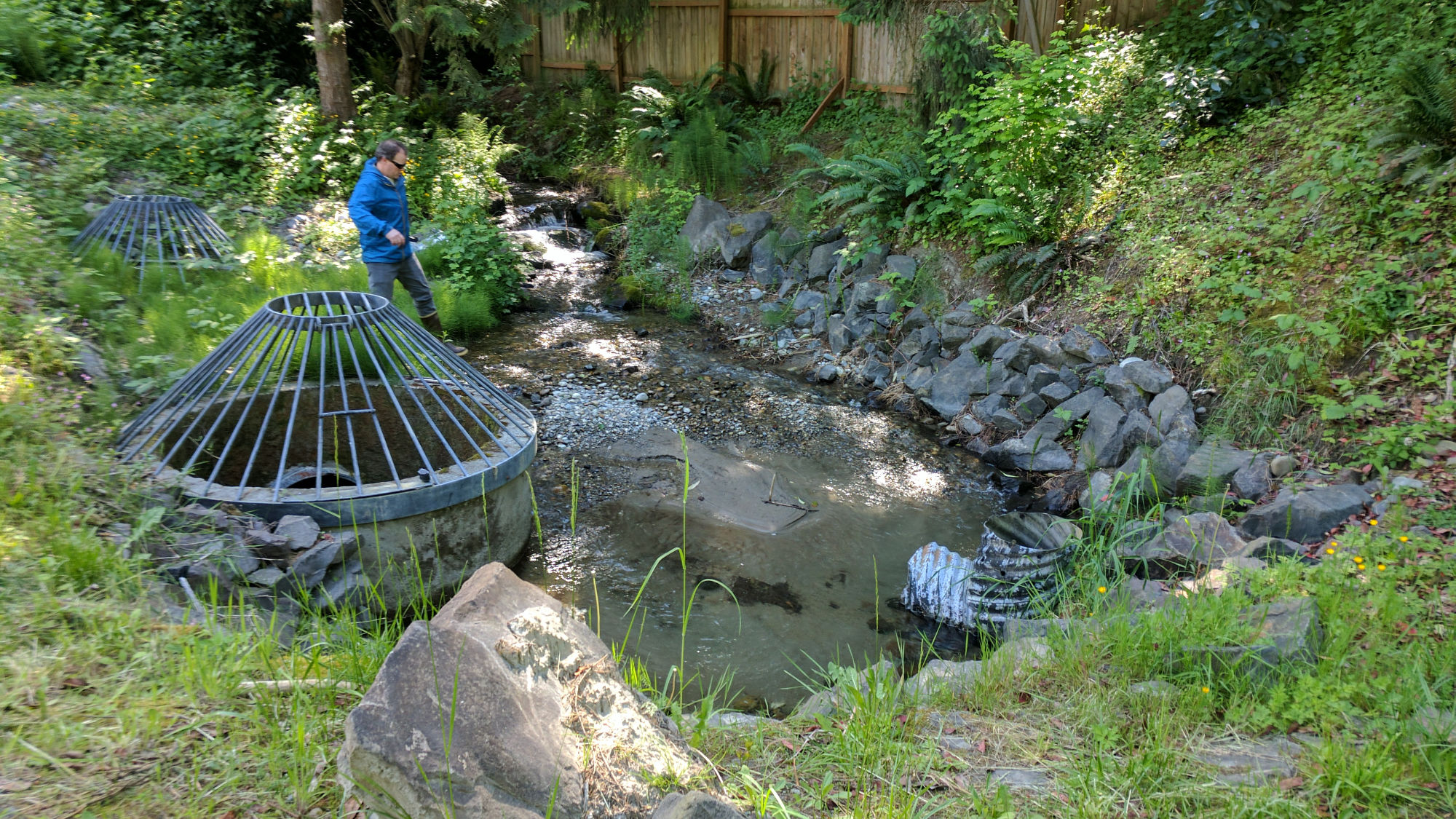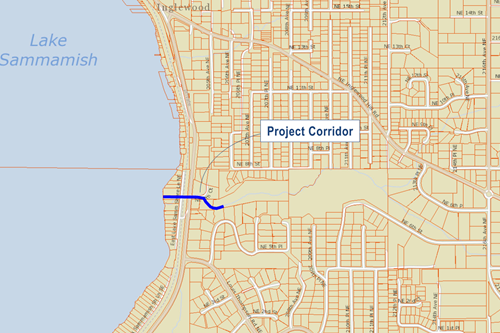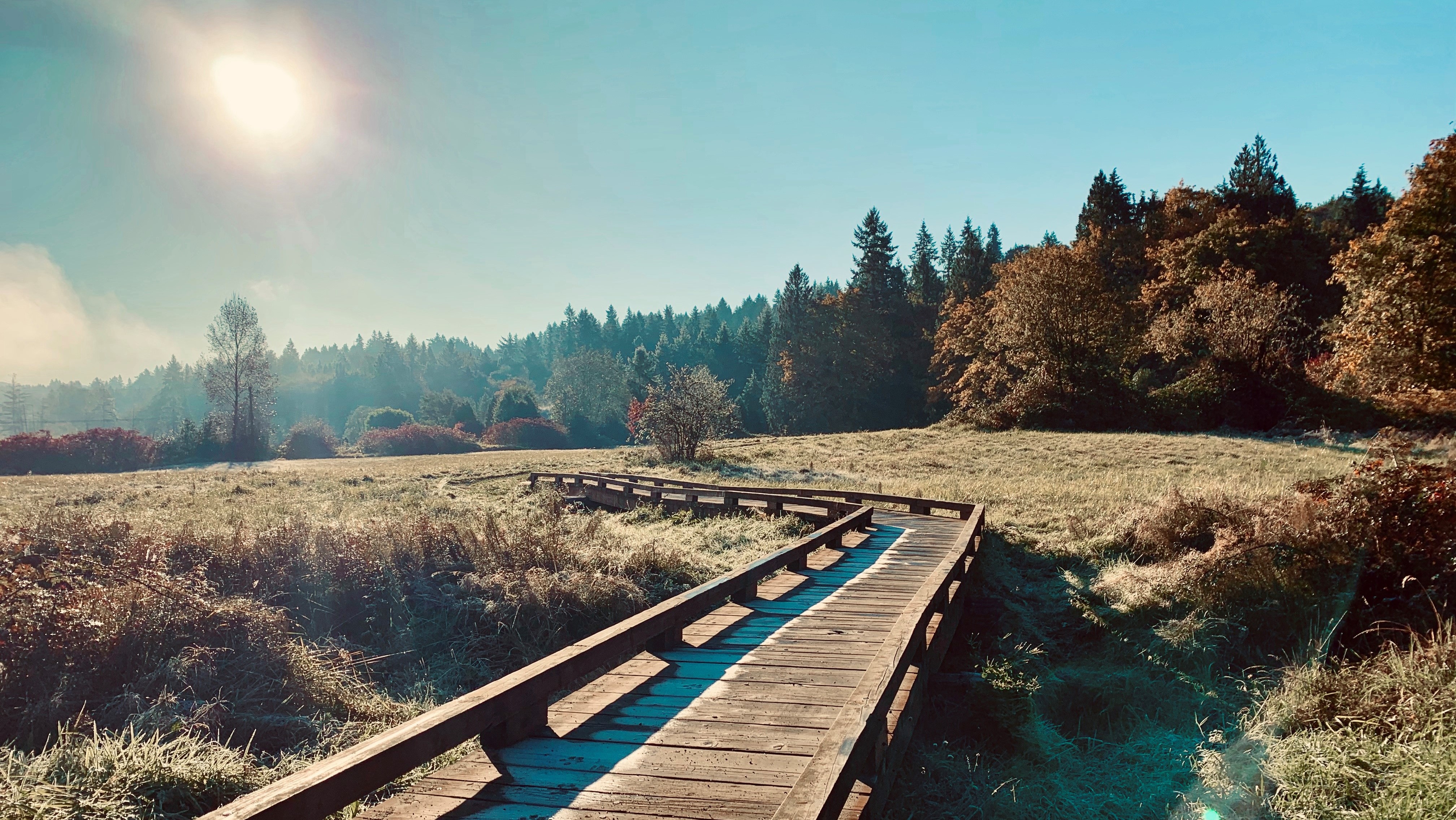George Davis Creek Fish Passage Culvert Project

Overview
Background
The Public Works Department initiated the George Davis Creek project in 2018 to address problems with the aging drainage system where the stream approaches East Lake Sammamish Parkway. Residents and staff identified multiple concerns including:
- Periodic flooding near the East Lake Sammamish Regional Trail and the Parkway.
- Costly annual maintenance to clear the drain system of stream sediment.
- Replacement needs as the system approaches the end of its predicted lifecycle.
- Multiple barriers to fish passage for migrating kokanee salmon and other native fish.
In 2019, the City identified a preferred option to replace the existing drain system with an open stream. The project corridor would extend from Lake Sammamish 900 feet east to a point where George Davis Creek flows through an undisturbed ravine.
Location

Design Focus
Project design is governed by the State Hydraulic Code (WAC 220-660) which requires any drainage improvements in a stream to consider passage for both resident and migratory fish. In response to these rules, project designers have devoted significant attention to ensuring the proposed improvements remove existing fish passage barriers.
A schematic map of the existing barriers illustrates the extent of the work needed to connect Lake Sammamish to the high quality stream habitat located 900 feet east of the lake. The proposed stream will eliminate these barriers and reestablish the stream through the developed lakeside corridor around East Lake Sammamish Parkway.
Partnerships
This project's success reflects cooperation with several regional groups and the broader community. The following organizations have offered significant support to this project:
King County Department of Natural Resources and Parks remains a critical partner in this project. Final improvements to the East Lake Sammamish Regional Trail require the County to replace the culverts that route George Davis Creek beneath the trail. Additionally, King County will replace the culvert beneath East Lake Sammamish Shore Lane NE.
Kokanee Salmon

Lake Sammamish is home to a population of kokanee salmon. This variant of sockeye salmon does not migrate to oceans but instead spends its adult life in freshwater lakes. The kokanee population unique to Lake Sammamish remains threatened by changing lake conditions, reduced access to spawning streams, invasive predator fish, and other pressures.
The Kokanee Work Group (KWG) formed in 2007 to prevent the extinction and improve the health of this native kokanee population. Through the Blueprint for the Restoration and Enhancement of Lake Sammamish Kokanee Tributaries, the KWG recognized the value of historic spawning streams to kokanee survival. This project seeks to achieve that goal.
In addition to creating 900 feet of potential spawning habitat where none now exists, the project will provide unimpeded access to an additional 2,000 feet of high quality stream upstream of the project corridor.
Project Delivery
Schedule
The project was paused for approximately three years to resolve legal challenges. Key milestones include:
| May 2018 | City requested proposals (RFP) from qualified consultants |
| July 2018 | City awards contract for preliminary design (Phase 1) to PBS |
| Spring 2019 | Preliminary design concludes with determination of preferred alternative |
| March 2019 | City acquires property to construct open stream between Shore Lane and Lake Sammamish |
| June 2019 | City awards contract for permitting and final design (Phase 2) to PBS |
| 2019 - 2022 | Initial engineering design, geotechnical investigations, property assessment |
| 2022-2024 | Project paused |
| 2025 | Final Design, obtain easements and secure permits |
| Feb 2026 | Advertise for construction bids |
| Jun 2026 | Begin Construction |
| Q4 2026 | Construction substantial completion |
| Q2 2027 | Construction final completion |
Design
PBS Engineering and Environmental (an Apex Company) continues to lead the consultant team providing project design work. In June 2025, PBS provided the City with detailed (90% complete) plans, technical specifications, and an estimate of construction costs.
This work continues to advance the evolving regulations and direction from the Washington State Department of Fish and Wildlife, and the US Army Corps of Engineers. A portion of the plans provides a detailed understanding of the project focus on recreating a natural stream system to replace the aging, under capacity storm drains.
Budget
Preliminary design efforts cost $90,000. Final design costs are estimated to total approximately $1.6M. The latest construction estimate is $9.1M. Property acquisition efforts are running concurrently with the design process.
Sammamish previously paid $4M for property to rebuild the stream between Lake Sammamish and Shore Lane. Approximately 65% of the purchase price was funded by grants.
Grants
The George Davis Creek project is receiving extensive financial support through a variety of grant programs. Key partners include:
- King County Department of Natural Resources and Parks
The County's Land Conservation Initiative is largely supported through the Conservation Futures grant program. Sammamish received a $2,000,000 grant to help purchase property needed for the project. - King County Flood Control District
Sammamish receives an annual allocation through the Subregional Opportunity Fund. Total project allocations to be determined. - King County Flood Control District
The District also dispenses funds through the Brian Bleifuhs Flood Reduction Grant Program. The City applied for a $1M grant under this program, awards announced Q4 2025. - Brian Abbott Fish Barrier Removal Board
Sammamish received a $722,350 FBRB grant for design costs, and applied for an additional $4.4M for construction. Grant awards announced Q3 2025 - Washington State Department of Commerce
Sammamish received a $504,700 direct capital appropriation from this commerce program. Funds are earmarked for construction.
All other project costs will be paid out of the City's Stormwater Capital program that is funded by surface water fees.
Project Team
- Prime consultant: Apex Companies, LLC (f/k/a PBS Engineering and Environmental)
- Stream analysis and design: Northwest Hydraulic Consultants
- Real estate services: Commonstreet Consulting
- Land surveying: Apex Engineering, LLC
- Geotechnical engineering: Aspect Consulting
- Cultural Resources: Stell Environmental
